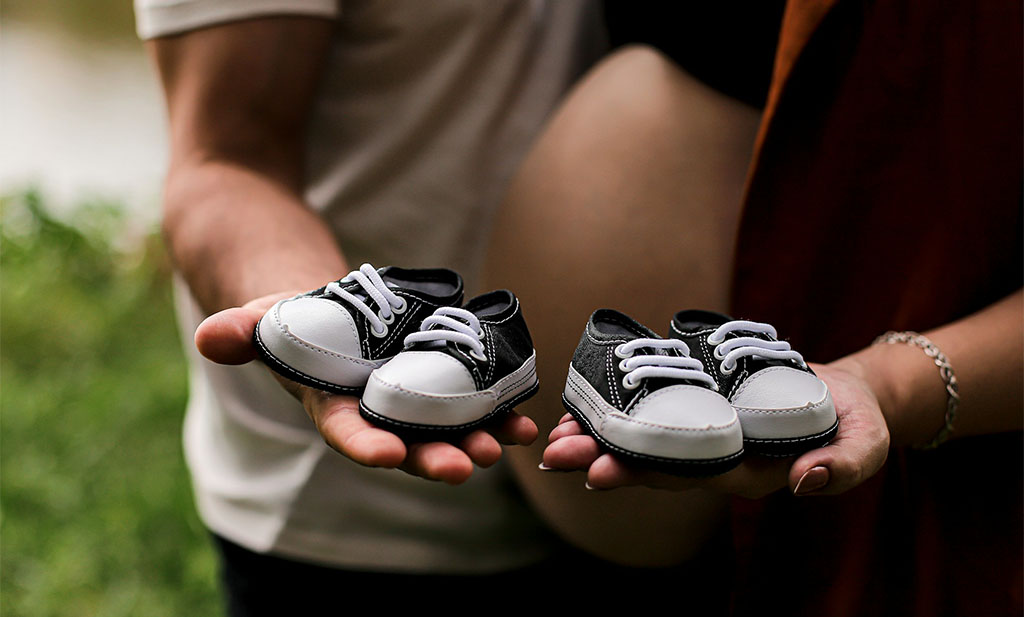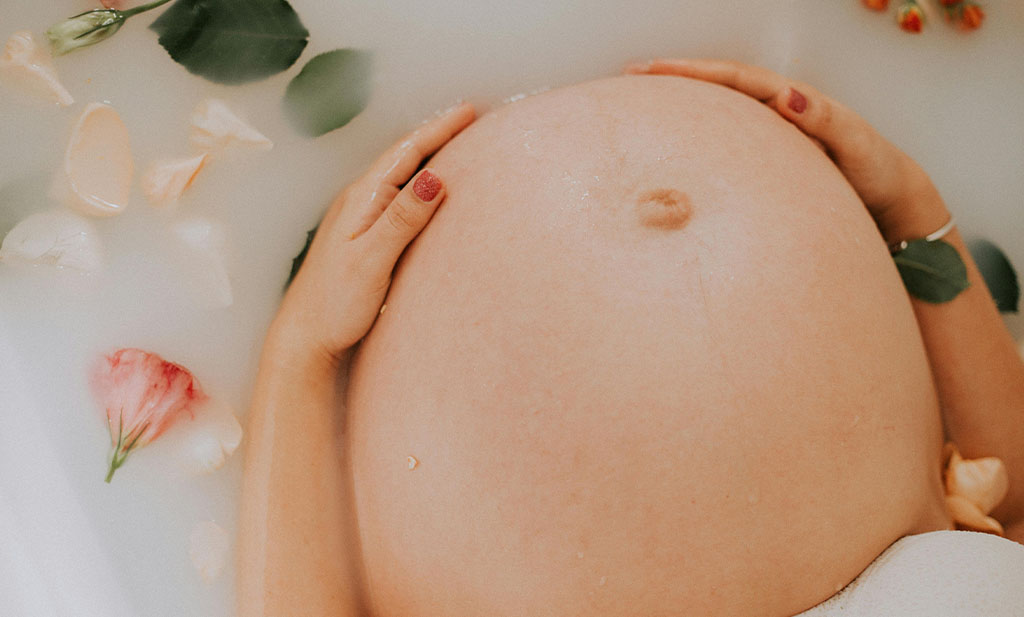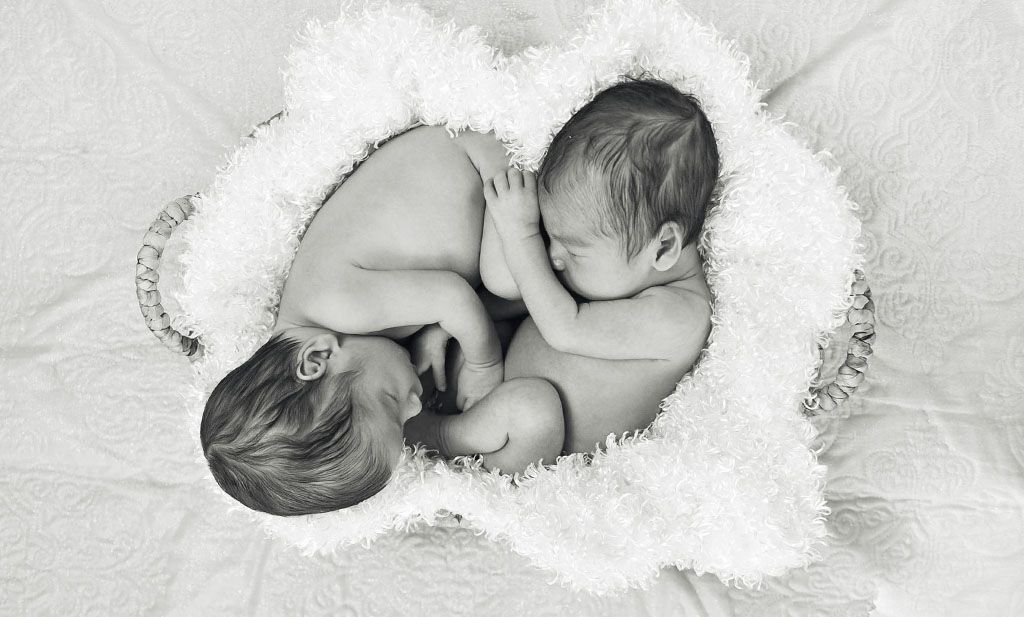
There can often be a whole mix of emotions when parents find out they are expecting multiples. This is understandable, as while double (or triple etc.!) the babies means double the love, a multiple pregnancy is officially considered a high-risk pregnancy and requires more extensive care than a singleton pregnancy. But what exactly are the risks and what do you need to consider if you are expecting more than one baby? We’re here to answer all your questions about multiple pregnancies in today’s blog post. Because knowledge and preparation can help alleviate worries and fears so that you can look forward to your double, triple or even multiple miracle in a more relaxed way.
What is a multiple pregnancy?
A multiple pregnancy means that more than one baby is developing in the womb at the same time. These can be twins, triplets or more babies. For expectant parents and doctors, this is a special situation that requires a lot of attention and care.
The likelihood of a multiple pregnancy depends on various things: How old is the mother? Are there multiples in the family? Has fertility treatment been carried out? Twins are more common, triplets or quadruplets are rather rare.
A multiple pregnancy is something very special and brings with it a number of challenges. From the initial diagnosis to the birth and everyday life with multiple babies, there is a lot to think about.
How can you recognise a multiple pregnancy?
At the beginning of a pregnancy, it is not always easy to recognise whether there are multiples. Many signs of a multiple pregnancy are similar to those of a normal pregnancy. Nevertheless, there are a few signs that could indicate multiples:
- Larger bump: The bump often grows faster early on with multiples.
- More nausea in the morning: Due to the higher hormone levels, nausea can be more severe.
- Faster weight gain: Birthing parents of multiples usually gain weight faster than with one baby.
However, you can only know for sure after an examination at the doctor’s surgery or by your midwife, for example with an ultrasound, a palpation or a blood test.
What are the symptoms of a multiple pregnancy?
In addition to the signs mentioned above, there are other symptoms that can indicate multiple pregnancies:
- Extreme tiredness: Your body has to work harder to care for multiple babies. This can be exhausting.
- More frequent bladder infections: There is more pressure on the bladder, which can lead to infections.
- More back pain: The extra weight puts more strain on your back.
- More frequent contractions: Premature labour can occur more frequently because the uterus stretches more.
If you notice these symptoms, it is best to speak to your doctor. They will ensure that you and your baby are well.
How do multiple pregnancies occur?
There are various reasons why the chance of having multiples can increase:
- Genes: If there have already been multiples in your family, the probability is higher. If you have a fraternal twin yourself, the chances of a multiple pregnancy increase.
- Fertility treatment: Methods such as artificial insemination or fertility drugs increase the likelihood of multiples. With in vitro fertilisation, for example, several eggs are fertilised and then often more than one is implanted in the uterus. This increases the chances that at least one embryo will manage to implant in the uterine lining. Sometimes several embryos are successful, resulting in a multiple pregnancy.
- Age of the mother: The chance of multiples increases slightly with increasing age.
- Origin: In some population groups, for example women from West Africa, multiples are more common.
But even if none of these factors apply to you, multiples can still occur.
Monozygotic vs dizygotic twins – what’s the difference?
If you are expecting twins, they can be identical (monozygotic) or fraternal (dizygotic). Identical twins have the same genetic make-up and look completely identical. Fraternal twins are created – as the name suggests – from two eggs that are fertilised by different sperm. Because identical twins share a placenta, this multiple pregnancy is more risky than that of fraternal twins. In both cases, close observation and care by your midwife and doctor are important and necessary.

What are the risks and complications of a multiple pregnancy?
A multiple pregnancy is considered a high-risk pregnancy because complications are more likely. Some of the most common risks are:
- Premature birth: because your body is under more strain and the uterus stretches more the babies may come earlier.
- Slower growth: Sometimes the babies don’t get enough nutrients and grow more slowly.
- Problems with the placenta: There may be difficulties with the supply from the placenta or premature detachment.
- Gestational diabetes and high blood pressure: These complications occur more frequently with multiples.
- Pre-eclampsia: One consequence of the considerable physical stress can also be that pre-eclampsia occurs during the course of your pregnancy.
It is important that you have regular check-ups. This way, risks can be recognised and treated at an early stage.
How to prepare for multiple pregnancy and birth
A multiple pregnancy and the birth of several babies is something very special. Both require good preparation – for the body and soul as well as from a financial and organisational point of view. Here are a few tips on how you can best prepare for this exciting time:
- Inform yourself: Read books, articles and guides about multiple pregnancies. That way you know what to expect and can prepare yourself better.
- Adapt your everyday life: Try your best to eat healthily, get enough sleep and do some light exercise. It’s good for you and your baby.
- Find out about birth options: Talk to your doctor or midwife about the various options for birthing your baby, e.g. a vaginal spontaneous labour vs a planned caesarean section.
- Make a list of birth preferences: Write down what is important to you during the birth and who should be there to support you.
- Prepare yourself mentally: The birth can be more stressful and longer than with one baby. Be open to last-minute changes of plan.
- Plan your finances: Multiple babies cost more. Think about how you can manage this.
- Get support: Ask family, friends and neighbours for help. Together you will be better able to cope with the challenges.
With good preparation, you can fully enjoy the special time of a multiple pregnancy. You will be able to keep a cool head even after the birth of your babies. You will also be much more confident going into the birth if you are well prepared.
Spontaneous birth or planned caesarean section for multiples?
While triplets and quadruplets are typically born by planned caesarean section in the UK, twins who develop without any abnormalities can also be delivered vaginally. As a multiple birth is always categorised as a high-risk birth, it’s generally recommended that you give birth in a hospital so that you and your babies can receive the best possible care.
Food and exercise during a multiple pregnancy
Good, healthy food and light exercise are important in a multiple pregnancy. They help you to feel better. They also support the health of your babies. What you should specifically look out for:
Food
- More calories: You need more energy than someone carrying one baby. Eat a balanced diet and pay attention to your nutrients.
- Plenty of protein: Protein is important for the development of babies. Good sources are lean meat, eggs, beans and nuts.
- Iron-rich food: You need iron for blood formation. You can find iron in spinach, wholemeal products and meat.
- Drink enough: Water, diluted juices or tea are important to prevent dehydration.
Exercise
- Light activities: Regular, gentle exercise such as walking or swimming keeps you fit and helps prevents back pain.
- No strenuous activities: Avoid too much exertion or sports with a risk of injury.
- Take breaks: Listen to your body and rest when you are tired.
Support for parents of multiples
It’s not just multiple pregnancies that can be physically and emotionally challenging. Everyday life with several babies of the same age is also a real feat of strength for new parents. It is therefore important that you seek help and support at all levels, both during pregnancy and after the birth.
- Medical care: Go to regular check-ups and follow-up examinations. Your doctors can recognise risks and problems early on and give you good advice. Your body is doing so much more than with a singleton pregnancy – and that is already immense. So take good care of it and keep an eye on it together with your doctors and midwife.
- Midwife support: An experienced midwife can provide you with great support during pregnancy and after the birth.
- Support groups & multiple birth podcasts: Exchange ideas with other multiple birth parents or get practical tips from podcasts by multiple birth parents. There are now quite a few of these. Both can be very helpful.
- Psychological counselling: Just the idea of what everyday life with multiples will be like, and ultimately of course everyday life itself, can make you feel overwhelmed and stressed. Nerves can quickly become frayed. Professional counselling can help you deal with the challenges.
- Family, friends & neighbours: Let your loved ones help you. Whether in the household, with shopping, with childcare or emotionally – every bit of support counts and others are often happy to help.
- Domestic help: If you can afford it then domestic help can relieve you of many tasks and give you more time for yourself and your babies.

Special points of contact for multiple parents
Every now and then, the everyday support you receive from friends, acquaintances and family is not enough. Or you don’t have the right people nearby to give you a helping hand. If this is the case, there are a few professional contact points that are designed to do just that. Don’t be afraid to ask for advice and support here:
- Family support: Many cities offer special help for multiple birth families. Ask at your local children’s centre.
- Multiple birth associations: There are associations that support multiple parents. There you can exchange ideas with others and get tips.
- Online forums: There are many groups for parents of multiples on the internet. There you can ask questions and network with others.
- Courses for parents of multiples: Some family education centres offer special courses for parents of multiples.
- Financial state aid: Find out about financial support and programmes for multiple birth families. Any help can be a relief.
Remember: Accepting help is not a sign of weakness, but shows that you are taking responsible care of your family. However, every multiple pregnancy is different and every family is unique. What is right for others is not necessarily right for you. Listen to your gut and speak openly with your doctor or midwife about your questions and wishes.
Practical tips for everyday life with multiples
When multiple babies arrive, your everyday life changes quite a bit. Here are a few practical tips that can help you day by day:
- Plan your day: Try to introduce fixed times for sleeping, eating and playing. This brings structure to the day.
- Use practical helpers: A double pram, baby carriers or nursing pillows can make everyday life easier. By the way: if you buy a pram with a large carrycot, you can sometimes fit two babies in it, or push one and carry one
- Share the work: If there are two of you, divide the tasks around the babies and the household fairly. Including at night.
- Think about yourselves: It’s hard, but take time for yourselves regularly to recharge your batteries. This is so important! Because you can only function in everyday life and be there for your babies if you’re feeling well.
- Be flexible: not everything has to be perfect. Be prepared to change your plans if necessary.
The right baby equipment for parents of multiples
As parents of multiples, you may or may not need special baby equipment. The basic rule for multiples is: less is more! Here are a few important things you should think about:
- Pushchair: A large double or multiple pushchair is super practical. Make sure there is enough space for bags and accessories.
- Cot: Separate cots for each baby are good so that everyone can sleep peacefully. Plan enough space for this.
- Feeding aids: Special nursing pillows for multiple parents can be very helpful if you want to breastfeed.
- Baby carriers: With baby carriers you can carry several babies at the same time and have your hands free.
- Bottles and accessories: If you are bottle-feeding, you will need enough bottles and accessories for all babies.
- Changing equipment: A large changing mat or several changing stations can make your life easier. Also: nappies, nappies and more nappies.
- Breast pump: If you want to give your little one breast milk, you will likely need a breast pump. Whether it’s to produce enough milk for several babies or to be able to call in helping hands when feeding.
- Clothes and accessories: Buy enough clothes, blankets and other items for all the babies. However, it doesn’t necessarily have to be double (twins), triple (triplets) or quadruple (quadruplets) the amount. A rough rule of thumb is: one and a half times as many toys and clothes for twins and about twice as many for triplets compared to a singleton.
Invest in good and practical equipment to make everyday life with multiples as relaxed as possible.
Breast/chestfeeding multiples – at the same time or one after the other?
If you have twins, you can indeed breast/chestfeed them at the same time. This is also known as tandem feeding. However, it requires some preparation, practice, a comfortable position, plenty of rest and a helping hand at first. Over time, however, you and your children will become more and more experienced.
You can also simply feed your babies one after the other and devote your time to each child. Or you can give one of them a bottle while the other is feeding from you.
However, if you have three or more children, it can be incredibly challenging to feed your newborn all by yourself. You should ask for support to meet everyone’s needs
Well prepared for multiple pregnancy and everyday life with multiples
Wow, that was quite a lot about multiple pregnancy, multiple birth and everyday life with multiples, wasn’t it? You are the parents of your babies and you know best what is best for them and for you. And if that’s not the case for a moment, you have a good overview here of where and how you can get support.
And otherwise: Talk to your doctor or midwife. They are experts and can give you good advice. And talk to other parents of multiples, whether in groups or online forums. This can be very helpful and show you that you are not alone because… you are not alone! With all the challenges that come with a multiple pregnancy, there are several miracles ahead of you in the end. And if you prepare for them well, you can really enjoy these truly exciting times.



